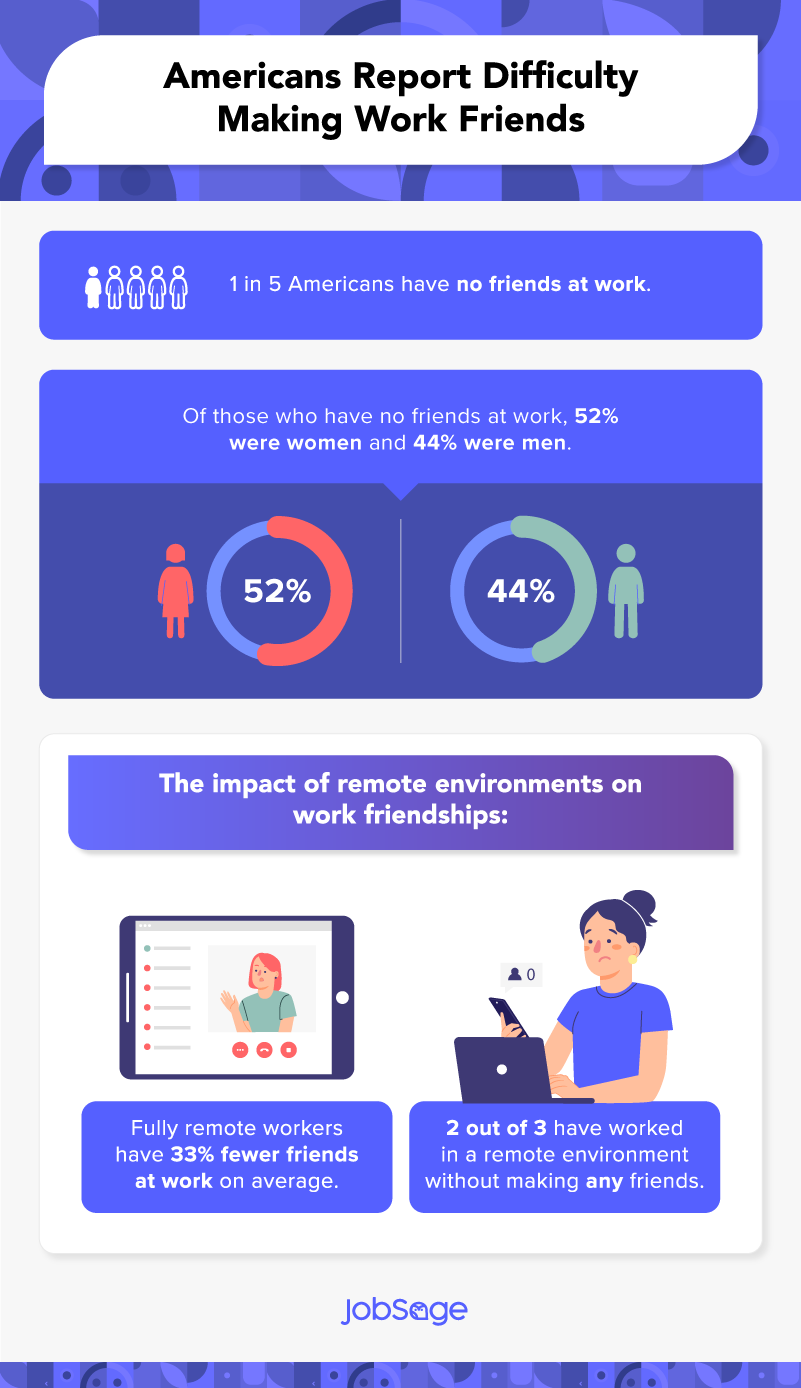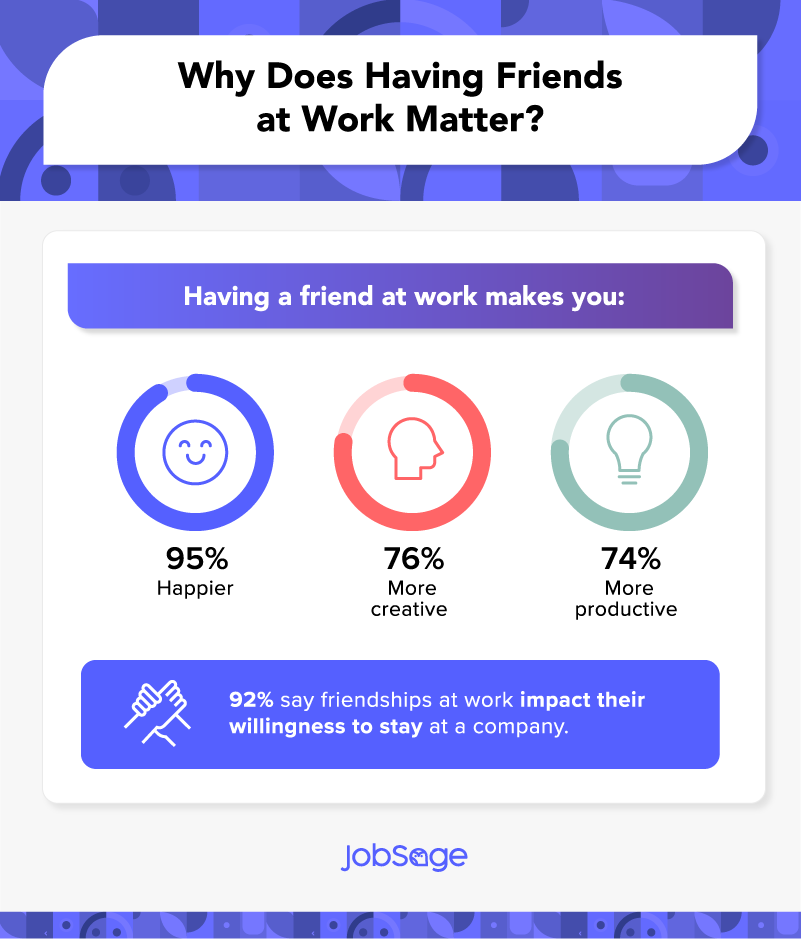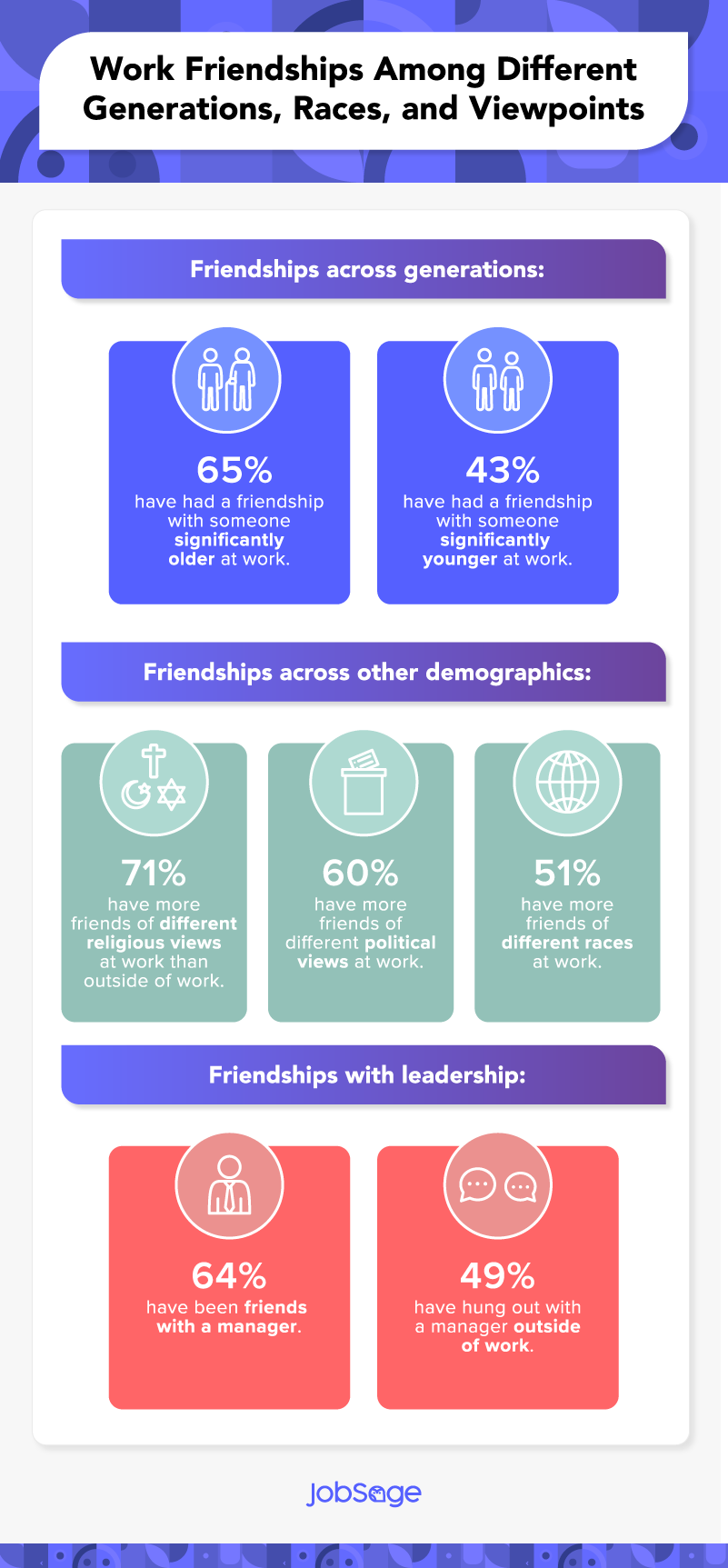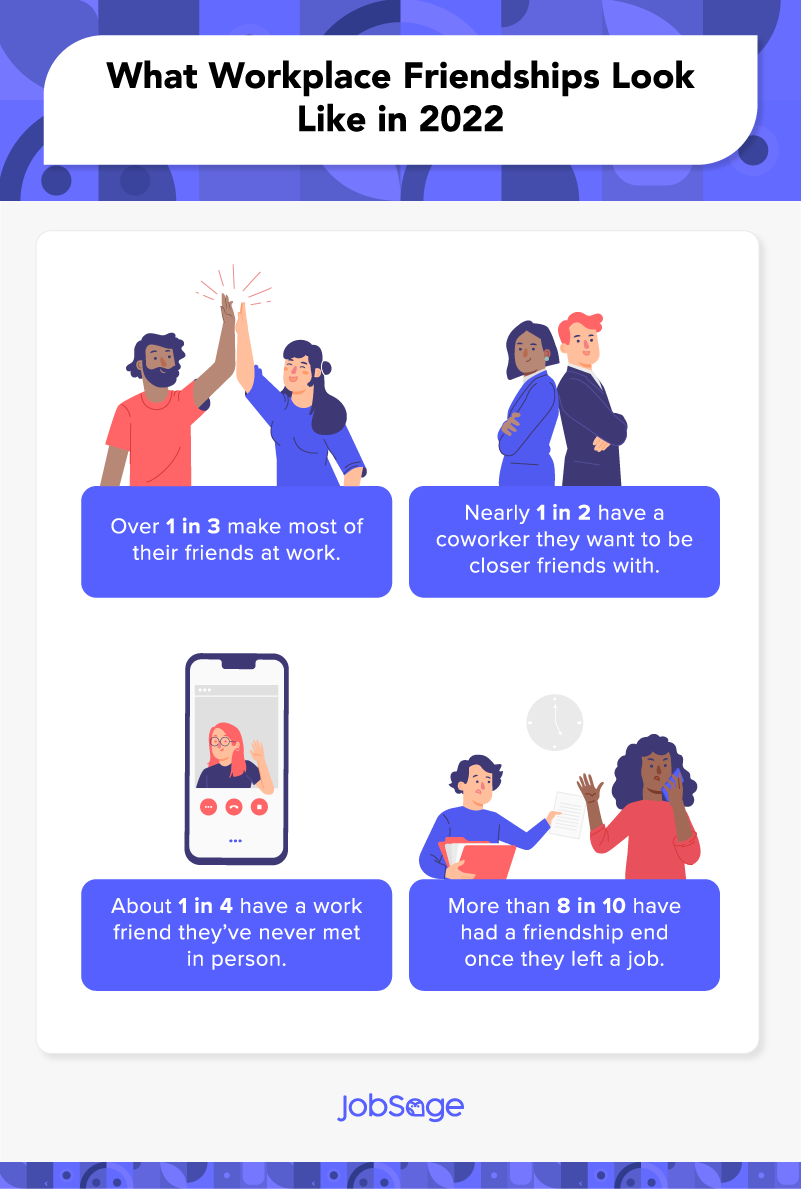For many Americans, our jobs offer much more than a way to pay the bills. They provide ways we can enact passions, further our personal development and build our social networks. Many of us have met lifelong friends, mentors or even romantic partners at our workplaces. However, with remote work rising in popularity in recent years (and experts predict the rise to continue), we wondered whether work still offered an easy place to make friends.
We explored how workplace friendship dynamics have shifted in 2022, especially for generations who have started their careers in remote-friendly environments. To do so, we surveyed over 1,200 Americans with a variety of industry experiences to determine the state of workplace friendships and relationships today.
Key findings
- Fully remote workers report 33% fewer friends at work.
- 66% of remote workers have not made a work friend.
- Millennials (39%) and Gen Z (21%) are the generations most likely to have no friends at work.
- 65% of Americans have had a friendship with someone significantly older at work.
- Baby Boomers are nearly two times more likely than Gen Z to make most of their friends at work.
84% of Americans have a harder time making friends when working remotely
In our survey, we defined a work “friend” as someone you have met at work and maintain a relationship with outside of your workplace. Based on this definition, respondents had, on average, 3 work friends at their current job. However, 1 in 5 reported that they have no friends at work. Of those who have no friends at work, women (52%) were more likely to report that they had no friends at their job than men (44%). When organizing the data by generation, Millennials (39%) and Gen Z (21%) are the generations most likely to have no friends at work.

When we filtered our results for workers who are currently fully remote, the average number of work friends dropped by 33%, from 3 to 2. Similarly, nearly two-thirds (66%) have not made a work friend in a remote environment. Clearly, remote environments present ample challenges when it comes to forming lasting relationships.
Our results also revealed that the COVID-19 pandemic had a heavy impact on workplace friendships. 48% of our respondents have fewer work friends than before the pandemic started, and 33% report feeling lonelier at work than before the pandemic.
95% of Americans say having a friend at work makes them happier
Next, we took a step back to consider whether friends at work matter. We found that coworker friendships matter a lot when it comes to creating a happy, energizing and creative work environment. In fact, 95% of respondents said that having a friend at work makes them feel happier. 76% indicated work friends make them more creative, and 74% said they help them be more productive.

At a time when Americans are changing jobs and switching careers more than ever, employers invested in retention may want to consider fostering an environment that encourages workplace friendships. According to our results, 92% say friendships at work are important factors when gauging their willingness to stay at a company. For Millennials (94%) and Gen Z (93%), the importance ranks even higher.
65% of Americans have had a friendship with someone significantly older at work
One of the most fun parts of work relationships is their sheer diversity. We may have a close friend that we consider a “work mom” or a “work dad” (a significantly older coworker that we consider a close friend), or more easily forge connections with people of different backgrounds due to working in close proximity. We may even enjoy closeness with a “work husband” or a “work wife” (which 25% of our respondents said they have).
We asked respondents about the prevalence of these kinds of relationships in their lives. As it turns out, 65% have had a friendship with someone significantly older at work, and 43% have had a friendship with someone significantly younger at work. In fact, 20% have had or been a “work mom” or “work dad.”

Respondents also reported that they commonly have more friends of different backgrounds at work than they do outside of work. 51% indicated that they have more friends of different races at work than outside of work. It’s even more common when it comes to political beliefs and religious beliefs: 60% and 71% of respondents, respectively, enjoy more friendships across those demographics than they do outside of work.
Friendships can also be found across different management levels. 64% of Americans have been friends with a manager at some point in their career, and nearly half (49%) have actually hung out with a manager outside of work.
Baby Boomers are nearly 2x more likely than Gen Z to make most of their friends at work
Despite some of the challenges that remote work presents, plenty of workplace friendships are alive and well in 2022. Regardless of company size, respondents were friends with 34% of their coworkers, on average. Nearly 1 in 4 (24%) currently have a coworker they’d consider a best friend.
Work relationships remain a large part of our social circles, as over 1 in 3 respondents (34%) make most of their friends in the workplace. However, this is clearly diminishing with each generation. This is how many of each generation responded “yes” to the question, “Do you make most of your friends at work?”:
- Baby Boomer: 40%
- Gen X: 37%
- Millennial: 35%
- Gen Z: 24%
It’s important to note that in-person employees (39%) were also more likely to make most of their friends at work, compared to fully remote employees (22%). Many members of Gen Z have graduated into a remote-heavy workforce, which could explain their lack of work friends.

Workplace friendships may be taking new forms as the world around us changes. Nearly 1 in 4 Americans has a work friend they’ve never met in person, and as their workplaces inevitably change over time, it might be harder to hold onto those friendships. In fact, 82% have experienced friendships ending once they left the job.
However, that doesn’t mean you shouldn’t try. If you currently have a coworker you’d like to be closer friends with, you’re not alone: 49% of Americans feel the same.
Our study reflects that younger generations and remote workers are facing challenges making friends in remote environments, which threatens their happiness, productivity and creativity at work, not to mention their company loyalty. If employers are seeking highly reviewed, productive environments with satisfied employees, finding ways to foster remote connections (that could eventually lead to friendships) are key.
Methodology
From May 14 to 25, 2022, we surveyed 1,200 Americans on their workplace friendships. 49% identified as male, 48% identified as female, and 3% identified as nonbinary or preferred not to say. 10% were Baby Boomers, 23% Gen X, 48% Millennials and 20% Gen Z.
